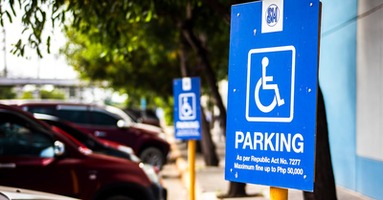
A Guide to Handicap Parking in Hawaii
Introduction: Navigating Handicap Parking in Hawaii
Welcome to "A Guide to Handicap Parking in Hawaii," your ultimate resource for understanding and navigating the parking facilities and regulations available to individuals with disabilities in the beautiful Hawaiian islands. Whether you're a resident or a visitor, this guide aims to provide you with valuable information on obtaining permits, identifying accessible parking spaces, and ensuring a seamless parking experience while exploring all that this state has to offer.
So, let's embark on this journey to demystify the world of handicap parking in Hawaii, ensuring that individuals with disabilities can enjoy their time on the islands without any unnecessary hurdles or inconveniences.
Understanding the Importance of Handicap Parking
Promoting Accessibility and Inclusion
One of the key reasons why disabled parking is crucial is its ability to promote accessibility and inclusion for individuals with disabilities. By designating specific parking spaces for those who require additional accessibility, society can ensure equal opportunities for participation and engagement. Handicap parking spaces serve as a tangible representation of our commitment to inclusivity and provide a starting point for creating a more accessible environment.
Ensuring Safety and Convenience
Disabled parking also plays a vital role in ensuring the safety and convenience of individuals with disabilities. These designated spaces are strategically positioned near building entrances, minimizing the distance that people with mobility challenges need to cover. Additionally, wider parking spaces allow for easier maneuvering of wheelchairs, walkers, and other assistive devices, reducing the risk of accidents and injuries.
Handicap Parking Permits in Hawaii
Types of Handicap Parking Permits
In HI, several types of disabled parking passes are available to individuals with disabilities. These passes vary based on the duration of their validity and the level of mobility impairment. Understanding the different types can help you determine the most appropriate pass for your needs.
- Temporary Permits: Designed for individuals with temporary disabilities that significantly affect their mobility, such as a broken leg or recovery from surgery.
- Permanent Permits: Intended for individuals with permanent disabilities that limit their mobility on a long-term basis.
- Disabled Veteran Permits: Exclusively available to veterans with disabilities resulting from military service.
Eligibility Criteria
To qualify for a handicap parking permit in Hawaii, you need to meet specific eligibility criteria. The state's Department of Health establishes these criteria to ensure that permits are issued to individuals who genuinely require accessible parking.
The eligibility criteria generally include:
- Having a physical or mental impairment that limits or impairs mobility.
- Requiring the use of assistive devices (e.g., wheelchair, crutches) or having a condition that necessitates the assistance of another person.
Applying for a Handicap Parking Permit
Applying for a handicap parking permit in HI is a straightforward process. You can obtain an application form from the Department of Health's website or by visiting a local driver licensing office. The application requires you to provide necessary personal information and medical certification from a qualified healthcare professional.
Once your application is complete, submit it along with any required documentation and payment of the applicable fees. The Department of Health will review your application, and if approved, you will receive your disabled parking pass by mail.
Renewing or Replacing a Handicap Parking Permit
Disabled parking passes in HI have an expiration date, and it's essential to renew them before they expire. The renewal process typically involves submitting a renewal application form and providing updated medical certification if required. Keep in mind that the renewal process may differ based on the type of permit you hold.
In case your pass is lost, stolen, or damaged, you can apply for a replacement. Contact the Department of Health and follow their guidelines to obtain a new one.
Identifying Accessible Parking Spaces
Accessible Parking Symbols and Signage
To identify accessible parking spaces in HI, it's important to familiarize yourself with the specific symbols and signage used. These visual indicators are universally recognized and allow individuals with disabilities to locate designated parking spots easily.
The international symbol of access, commonly known as the wheelchair symbol, is prominently displayed on signs and pavement markings. It consists of a white figure in a wheelchair on a blue background. Look out for these symbols when searching for disabled parking spaces.
Accessible Parking Space Requirements
Accessible parking spaces must adhere to certain requirements to ensure they accommodate individuals with disabilities adequately. These requirements include specific dimensions, slopes, and access aisles. By meeting these standards, parking spaces become more accessible and convenient for disabled individuals.
Some essential requirements for accessible parking spaces include:
- Width: Generally, accessible parking spaces are wider than standard spaces to accommodate wheelchair users and individuals with mobility aids.
- Access Aisles: Access aisles provide the necessary space for wheelchair users to enter and exit vehicles. They must be wide enough to accommodate a wheelchair ramp or lift.
- Slope: The surface of accessible parking spaces should have a minimal slope to facilitate safe and easy movement.
Accessible Parking Space Locations
Accessible parking spaces are strategically located in various areas to ensure convenient access to facilities and services. In HI, you can typically find them in the following locations:
- Near Building Entrances: Accessible parking spaces are often positioned near the entrances of buildings to minimize the distance individuals with disabilities need to travel.
- Close to Elevators and Ramps: Parking areas near elevators and ramps provide easy access to multi-story buildings or structures with elevated entrances.
- Adjacent to Accessible Routes: Accessible routes are pathways designed for individuals with disabilities. Accessible parking spaces are usually located adjacent to these routes for seamless movement between parking areas and facilities.
Remember to look for the wheelchair symbol and signage indicating accessible parking when searching for these designated spaces.
Parking Facilities and Accessibility
Public Parking Facilities
The states public parking facilities are required by law to provide accessible parking spaces for individuals with disabilities. Whether you're visiting popular tourist destinations, government buildings, or public parks, you can expect to find designated disabled parking areas.
Public parking facilities prioritize accessibility and strive to comply with regulations to ensure equal access for all. However, it's always advisable to arrive early to secure an accessible parking spot, especially during peak hours or busy seasons.
Private Parking Facilities
Private parking facilities, such as shopping centers, restaurants, and hotels, also have a responsibility to provide accessible parking spaces. These establishments must comply with accessibility requirements and ensure that individuals with disabilities have equitable access to their services.
When visiting private parking facilities, keep an eye out for designated disabled parking spaces. If you encounter any issues or find that accessibility standards are not met, you can contact the management or report the situation to the appropriate authorities.
Handicap Parking Violations and Enforcement
Penalties for Misusing Handicap Parking Spaces
Misusing disabled parking spaces is not only inconsiderate but also against the law. Violators who park in designated accessible spaces without a valid pass can face significant penalties and fines. These penalties vary from state to state, and HI has its own set of regulations to discourage misuse of these parking spaces.
The penalties for disabled parking violations may include fines ranging from $250 to $500 for the first offense. Subsequent offenses can result in higher fines, potential vehicle towing, or even suspension of driving privileges. These penalties aim to protect the rights of individuals with disabilities and ensure the availability of parking spaces for those who truly need them.
Reporting Handicap Parking Violations
If you witness a handicap parking violation, it's important to report it to the appropriate authorities. Reporting such violations contributes to the enforcement of parking regulations and helps maintain the integrity of accessible parking spaces.
To report a this parking violation, note down important details such as the license plate number, location, and time of the incident. Contact your local law enforcement agency or the parking enforcement department to provide them with the necessary information. Your report can make a difference in promoting a more accessible environment for individuals with disabilities.
Frequently Asked Questions
Can I use a valid out-of-state handicap parking permit in Hawaii?
Yes, HI recognizes valid out-of-state disabled parking passes. Visitors with a disability parking pass issued by another state can use their pass in this state without any issues. However, it's important to adhere to Hawaii's disabled parking regulations and park only in designated accessible spaces.
How long is a handicap parking permit valid in Hawaii?
Parking passes in HI have different durations depending on the type of pass. Temporary ones are typically valid for six months, while permanent ones are valid for up to four years. Disabled veteran permits are valid for five years. It's essential to renew before it expires to continue enjoying its benefits.
Can a caregiver use the handicap parking permit without the disabled person present?
In HI, caregivers can use a disabled parking pass without the disabled person present, but only if they are transporting the individual with the disability or running errands on their behalf. Caregivers should ensure that the disabled person's pass is valid and displayed correctly while using accessible parking spaces.
Are there any exemptions for handicap parking regulations in Hawaii?
HI does not provide exemptions for disabled parking regulations. All individuals, including government officials and law enforcement, must comply with parking laws. Exceptions are not granted for emergency vehicles, short stops, or other similar circumstances. This ensures fairness and equal treatment for all individuals with disabilities.
Can I park in a metered parking space without paying if I have a handicap parking permit?
In HI, individuals with a disabled parking pass are allowed to park in metered parking spaces without paying. However, it's important to note that this exemption only applies to parking meters, not other types of paid parking facilities. Always check for specific instructions or signage regarding parking fees to ensure compliance with local regulations.
Is there a specific distance requirement between accessible parking spaces and building entrances?
In HI, there is no specific distance requirement between accessible parking spaces and building entrances. However, accessible parking spaces should be located as close as possible to the entrance for the convenience of individuals with disabilities. Building owners and parking facility managers should strive to minimize the distance between accessible parking spaces and building access points.
Conclusion
In conclusion, "A Guide to Handicap Parking in Hawaii" has provided valuable insights into the world of handicap parking in the beautiful Hawaiian islands. We explored the importance of disabled parking in promoting accessibility, inclusion, safety, and convenience. Understanding the different types of disabled parking permits, identifying accessible parking spaces, and knowing the regulations and enforcement procedures ensures a seamless parking experience for individuals with disabilities.
Remember to respect and prioritize the needs of individuals with disabilities when utilizing disabled parking spaces. Together, we can create a more accessible and inclusive environment in HI and beyond.
.png)






